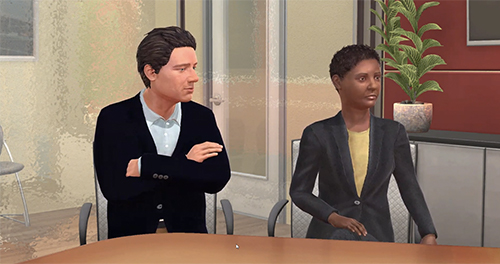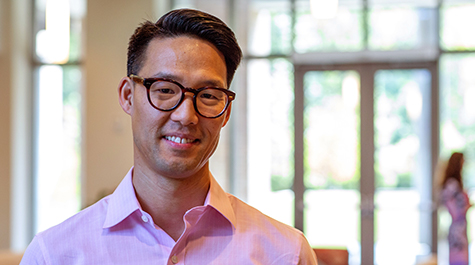JEDI Alliance: Building a coalition to advance equity, diversity in the geosciences
Representation of racial and ethnic minorities in the geosciences is abysmally low in the U.S., with only 6% of all geoscience doctorate degrees in 2016 going to underrepresented minorities — the lowest proportion in all of the STEM fields and a statistic that has remained virtually unchanged for more than four decades.
Jason Chen, Gerdelman Family Term Distinguished Associate Professor, has secured a new grant from the National Science Foundation (NSF) that aims to combat that inequity by building a national alliance of researchers working together to effect large-scale change.
The project, entitled “A JEDI Alliance to Develop Leaders for Sustainable Culture Change in the Geo- and Environmental Sciences,” is a $100,000 planning grant with the goal of developing a project and proposal that could secure substantial funding in the future.
“This planning grant gives us one year to develop a project that has the potential to substantially move the needle in terms of diversity and equity in the field,” says Chen. “That’s a huge undertaking, but we’ve got some great building blocks to work with.”
In 2016, the NSF convened a group of 30 scholars and practitioners for an Ideas Lab designed to generate innovative solutions to create a more just, equitable, diverse and inclusive (JEDI) culture in the geosciences. The group included academics and professionals from the geosciences, as well as experts in educational psychology, policy studies and educational leadership.
From that Ideas Lab, five separate projects emerged and were subsequently funded by the NSF through a program called GEO Opportunities for Leadership in Diversity (GOLD). Each took aim at the issue of leadership development, asking the fundamental question: How do we shift the culture of the geosciences by developing leaders who can champion and sustain systemic change in justice, equity, diversity and inclusion?
Although all the projects had the same goal, each approached the topic in different ways, collected different types of data and had different visions for possible solutions.
Chen was lead investigator for one of these five GOLD projects. His project, GEOsciences Diversity Experiential Simulations, or GEODES, used mixed-reality immersive simulations to train university-level educators to recognize and eliminate prejudice in the field.
 “It’s like a flight simulator,” says Chen. “Using virtual reality, we simulate situations that university leaders might have experienced or would likely be involved in, such as a hiring search committee. These hyper-realistic scenarios allow them to practice, in a low-risk environment, how to intervene when prejudice appears and advocate for change.”
“It’s like a flight simulator,” says Chen. “Using virtual reality, we simulate situations that university leaders might have experienced or would likely be involved in, such as a hiring search committee. These hyper-realistic scenarios allow them to practice, in a low-risk environment, how to intervene when prejudice appears and advocate for change.”
The other GOLD projects explored different facets of the issue and different solutions. One project examined the nature of exclusion and prejudice during field experiences, a major element of work in the geosciences. Another explored the effectiveness of a triad mentoring program, which matched early career, underrepresented faculty members with both a senior faculty member in the same department and an outside expert in diversity and inclusion.
All five GOLD projects have now completed their work. As the projects came to a close, the NSF announced a new challenge for the researchers: Is there a way to coalesce these projects into one large project that could result in major, national-level change?
Chen likens it to Voltron, one of his favorite cartoons growing up. “Voltron was this mega-superhero that formed when five robot lions merged together,” he says. “Our task is to take these five distinct projects and merge them into one super-project, and our hope is that the collective whole will be greater than the sum of its parts.”
Over the course of the coming year, Chen will work with the project leads to combine forces and identify one unified vision. Kardia Group, a consulting firm that has been involved with GOLD since the projects were birthed in the Ideas Lab, will provide additional support.
They’ll compile data from the existing projects, identify new data needed, create communications and decision-making mechanisms, and identify a backbone organization that will provide leadership and logistical support for the alliance.
“The backbone organization will be like the brain or central nervous system for the project,” says Chen. “It will drive the project, coordinating action and communication among the stakeholders.”
The proposal called for a three-day kickoff in Colorado this fall, though the team is already shifting plans so they don’t lose momentum due to the COVID-19 pandemic. Instead of meeting in person, they’re planning for 10 virtual, monthly mini-conferences, each focused on a single aspect of the project.
“That big grant on the horizon motivates me to get up in the morning,” says Chen. “My heart is in this research, because I know personally the effects of exclusion, homogeneity and inequity. As a researcher, I’m certainly driven by the competitive aspect, but even more by the desire to serve — to really have an impact on communities.”
He is quick to credit the mentors and supports that have helped him along the way, including colleagues from W&M such as Heather Macdonald, Chancellor Professor of Geology, who co-mentored students with him and first introduced him to the GOLD project. He also points to the camaraderie and support of fellow researchers within the GOLD community, which he says is characterized by a strong level of trust and generosity.
“I never thought I’d be doing this kind of work,” he says. “It’s been a wonderful confluence of interesting people and interesting questions guiding me in this direction. I’m really excited about where it will take me next.”
